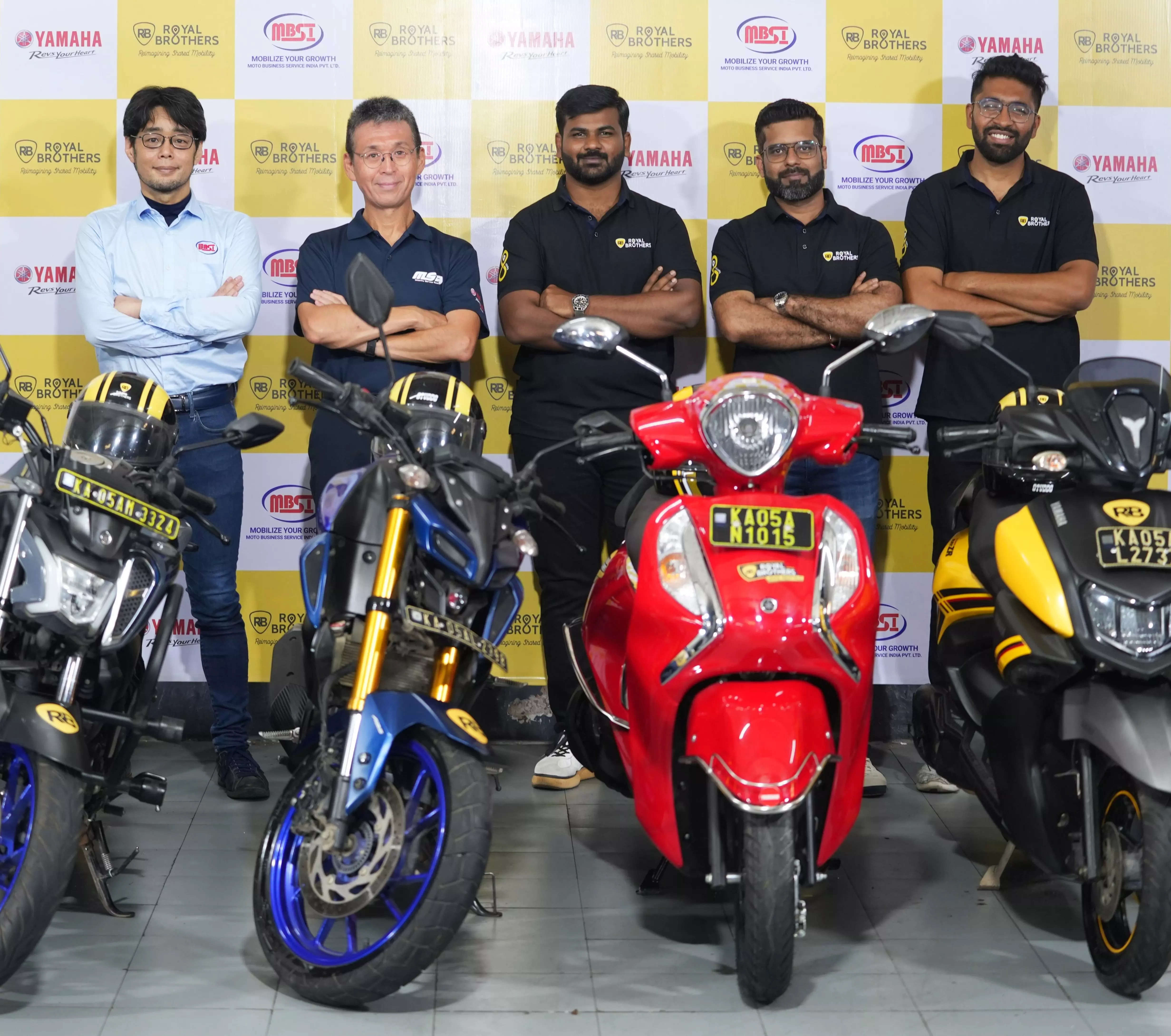
New Delhi: There are two sides to Yamaha in India. One is the well known brand that produces premium bikes and scooters while the other low profile entity leases out two-wheelers to mobility operators as part of an asset management model.
The Bengaluru-based Moto Business Service India (MBSI), a subsidiary of Yamaha Motor Company, is barely three years old. Headquarters in Japan had set up a similar leasing model in Africa first before deciding to expand its presence in India.
“We are taking up the challenge in this new style of business. Yamaha is a typical manufacturer of motorcycles and motorised products and our model is designed basically around manufacturing, sales etc. We are now trying to diversify from this domain,” Terajima Shungo, General Manager, Mobility Service Business Division, Yamaha Motor Co, told ETAuto.
This is where MBSI will play an important role going forward and headquarters in Japan is upbeat about its prospects especially when there is a distinct shift happening from the ownership to usership model across emerging markets. “We see new changes and approaches in the market which has prompted us to step into the asset management style of business. Yamaha has noticed that this trend of moving away from ownership is happening with the younger generation in India,” said Shungo.
From the company’s point of view, this is a market that is way too huge to be ignored and more so when over two-thirds of its population is under 30 years old. MBSI has, consequently, been forging strategic partnerships with local players and recently made an investment in Royal Brothers which is focused on the rental bike business.
Bonding with Royal Brothers
“The management team is young and resilient and it is a good opportunity for us to team up. We are just not putting in capital but providing motorcycles to our partners,” explained Shungo. Over 1,000 vehicles will now come onboard the Royal Brothers platform in South India with other parts of the country due to follow in course of time.
According to him, India is a leading market for this change in mobility preferences where partners like Royal Brothers will lead the way. The behavioural trends will become an important template for the top management in Japan to understand the market better and plan the next round of initiatives.
There is no question that the manufacturing entity, Yamaha Motor India, remains critical as the front end for the brand. The company’s market share still remains in single digits and it lags behind Hero, Honda, TVS and Bajaj. However, it is now hoping to make the most of the premium wave in the two-wheeler arena with its FZ and MT range along with the Aerox scooter.
This presence becomes even more relevant since MBSI does not deal solely with the Yamaha brand but offers a basket of models from a host of Indian manufacturers. As Nakao Hiroshi, Managing Director of MBSI, put it, “Yamaha wants to have additional business in India and right now the model is essentially about ownership. How much this will change remains to be seen and we continue to have discussions internally.”
What has emerged from these talks is is that “motorcycles will become mobility where some customers will use it for ownership and some as a service”. According to Hiroshi, mobility by itself will diversify and be driven by varieties of customers and demand in the future.
Quality of life
“Both the core objectives of ownership and mobility diversification are to build a better quality of life for the end user. Beyond this, the customer needs to have a variety of experiences and this is our mission,” he continued.
Shungo said not having the Yamaha brand to define MBSI was not so important since “this is about customer demand” which is potentially huge. “We would, of course, like them to use our branded products but they also need to be satiated with diverse tastes. In order to understand these buying patterns, the Yamaha brand name is not necessarily effective in some cases,” he candidly added.
This also follows the reality of the company’s limited presence in some segments since it has now decided to focus solely in the premium space. To that extent, MBSI “intentionally did not use” the Yamaha brand as part of a deliberate strategy.
“We decided to explore the market without branding and being customer-centric is a new approach. With a Yamaha brand name, we would have had to come with a company-branded product. Given that it does not have a high market share in India, this would have limited our business potential with MBSI,” elaborated Shungo.
The good part is that having local allies like Royal Brothers will yield vital market research which could even help Yamaha Motor India carve out a sharper strategy. “We are learning and hopefully the feedback will help us deliver better products for the Indian market,” he added.
Unique strengths
Abhishek Chandrashekar, CEO of Royal Brothers, said Yamaha offered unique strengths in processes, planning and execution. “We took their help to build a structure in terms of operations and support systems. Bike rental has a lot of issues at the backend like servicing, timely delivery and we are building an industry which has not been taken to this scale,” he explained.
The goal is now to build mobility as a service to new heights which is plausible given that Gen Z is really not into ownership of bikes and would much rather rent them out. Chandrashekar said a lot of rides happen in the weekends and users try multiple models each time.
The Suzuki Access 125 is popular in Hyderabad while residents of Bengaluru opt for the 110cc Honda Activa. Beyond these two cities, the usership model is working well in Udupi, Manipal, Ahmedabad, Thiruvananthapuram, Kochi, Visakhapatnam, Tirupati and Guntur.
According to Shungo, Indians like bigger bikes and seek a better quality of life, a trend that is visible in other emerging markets which are seeing a rise of the “richer middle class.” He reiterated that affluence was playing playing a big role in fuelling mobility needs for activities like tourism and sightseeing. “This did not happen before in emerging markets and the change will create demand and opportunities for Yamaha,” said Shungo.
Ageing society
Japan is also an ageing society which means that “we need to change our mindsets and this is the new challenge”. The company is, therefore, taking a good look at the future of mobility while striving to be ahead of the game.
Hiroshi was categorical that MBSI had to grow its presence quickly and not lose out on opportunities. “We will then plan better products and then expand our business. Keeping the vehicle quality at high levels is top priority and half of MBSI is focused on service to ensure good maintenance,” he said.
As for electric offerings, Hiroshi said this was inevitable for MBSI but the key was in joining hands with “trustworthy OEMs.” At present, India now has over 400 EV makers and “I believe the last man standing would be critical” especially when subsidies are now being withdrawn.
“For us, the best manufacturer is key to MBSI and we have Yamaha to help us evaluate in terms of tying up with an OEM,” signed off Hiroshi.















